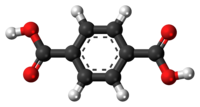
Photo from wikipedia
Toluene methylation using methanol offers a high potential molecular engineering process to produce p-xylene (PX) based on shape-selective catalysts. To further improve the process economics, a novel short process was… Click to show full abstract
Toluene methylation using methanol offers a high potential molecular engineering process to produce p-xylene (PX) based on shape-selective catalysts. To further improve the process economics, a novel short process was proposed by reducing the high-energy consumption separation of xylene isomers in existing processes since the PX selectivity of the xylene isomers can be enhanced more than the industrial product quality of 99.7%. The PX selectivity intensification was achieved as a result of decreased contact time by considering factors such as the feed ratio, diluents, temperature, and pressure in a toluene methylation reactor. This proposed short process indicated that the reactor effluent could be purified only through the two conventional distillation towers by removing the methanol recovery and separation of xylene isomers. The raw material utilization, energy consumption, and economic data were also analyzed for the six contrastive cases. The short process using catalyst Si–Mg–P–La/ZSM-5 exhibited the highest effective utilization rates of 96.27 and 95.50% for toluene and methanol, respectively. The short process also showed a good economic value in terms of capital investment and operating costs due to the multistage reactor without benzene byproducts. Thus, the obtained total annual cost (TAC) value of 13 848.1 k$·year–1 was 68.9 and 87.9% of the two existing processes.
Journal Title: ACS Omega
Year Published: 2022
Link to full text (if available)
Share on Social Media: Sign Up to like & get
recommendations!